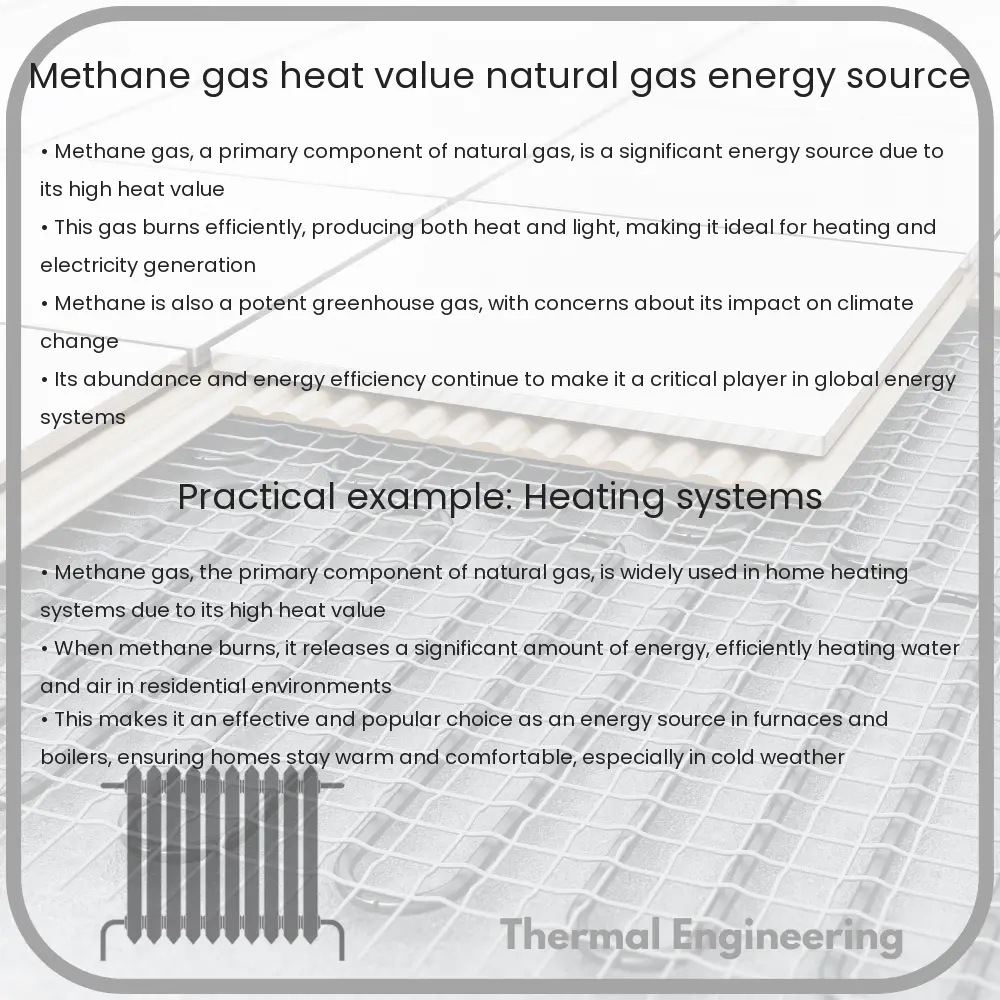Comprehensive analysis of methane’s heat value, role in natural gas, and utilization as an efficient energy source.

Understanding Methane: Heat Value, Role in Natural Gas, and as an Energy Source
Methane gas, chemically represented as CH4, is a colorless, odorless gas that plays a crucial role in both our environment and the energy sector. Its significance stems from its energy content and its widespread use as a primary component of natural gas. This article delves into the heat value of methane, its place in natural gas, and its utility as a potent energy source.
Heat Value of Methane
The heat value of a fuel is a measure of the amount of energy released when a certain amount of the fuel is burned. This property is crucial for assessing the efficiency and suitability of fuel for various applications. For methane, there are two primary numbers to consider:
- Higher Heating Value (HHV): Also known as the gross calorific value, HHV of methane is about 55.5 MJ/kg (MegaJoules per kilogram). This value represents the total amount of heat released when methane is completely combusted and the water vapor in the exhaust is condensed, thus capturing its latent heat.
- Lower Heating Value (LHV): LHV is around 50 MJ/kg for methane. This number accounts for the energy released when the water remains as vapor and the latent heat of vaporization is not utilized.
The difference between HHV and LHV is significant in industrial applications where the recovery of latent heat can lead to enhanced efficiency.
Methane as a Major Component of Natural Gas
Methane is the primary component of natural gas, typically comprising 70-90% of its composition. The rest of the gas is made up of other hydrocarbons (like ethane, propane, and butane), nitrogen, carbon dioxide, and trace amounts of other gases. The high methane content is what gives natural gas its high calorific value, making it an efficient fuel choice for heating, electricity generation, and as a feedstock in various chemical processes.
Utilization of Methane as an Energy Source
Methane’s potent energy characteristics make it a cornerstone of the global energy supply. It is used in several key ways:
- Electricity Generation: Methane is burned in gas turbines or steam boilers to generate electricity, often in combined-cycle systems that boast high efficiency by utilizing both gas and steam turbines.
- Heating: In residential and commercial settings, methane is used for space heating, water heating, and cooking. It is preferred for its cleanliness and efficiency compared to other fossil fuels.
- Industrial Fuel: Methane is a critical source of heat and power for various industries, including metals, cement, and glass manufacturing.
- Transportation Fuel: Compressed natural gas (CNG), predominantly methane, is used as a cleaner alternative to gasoline and diesel in vehicles.
In addition to these applications, methane plays a significant role in hydrogen production, particularly steam methane reforming (SMR), which accounts for a substantial part of global hydrogen production primarily used in refining and chemical synthesis.
The Environmental Impact
While methane is a cleaner-burning fossil fuel compared to coal and oil, it has significant environmental implications. Methane is a potent greenhouse gas, with a global warming potential approximately 25 times greater than that of carbon dioxide over a 100-year period. Leaks during extraction and transportation of natural gas contribute to its release into the atmosphere, highlighting the need for stringent leak detection and mitigation technologies.
As the world seeks to balance energy needs with environmental sustainability, the role of methane will continue to evolve. Technological advancements in methane leakage reduction and enhanced recovery of natural gas can mitigate its environmental impact while harnessing its energy potential effectively.
Understanding the properties, uses, and impacts of methane is fundamental for making informed decisions regarding both energy policy and individual energy use.